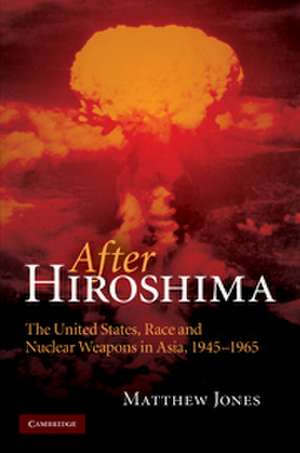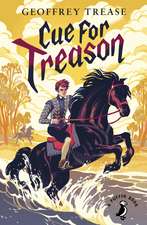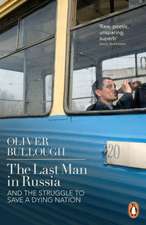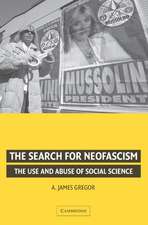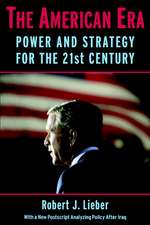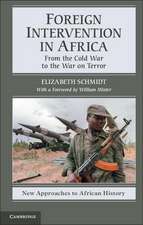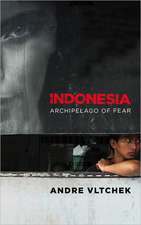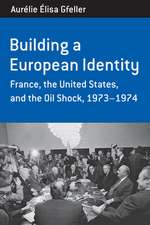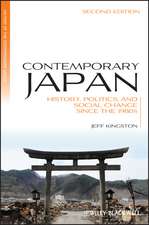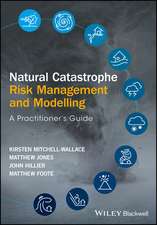After Hiroshima: The United States, Race and Nuclear Weapons in Asia, 1945–1965
Autor Matthew Jonesen Limba Engleză Paperback – 27 iun 2012
| Toate formatele și edițiile | Preț | Express |
|---|---|---|
| Paperback (1) | 441.71 lei 6-8 săpt. | |
| Cambridge University Press – 27 iun 2012 | 441.71 lei 6-8 săpt. | |
| Hardback (1) | 875.35 lei 6-8 săpt. | |
| Cambridge University Press – 14 apr 2010 | 875.35 lei 6-8 săpt. |
Preț: 441.71 lei
Nou
Puncte Express: 663
Preț estimativ în valută:
84.52€ • 88.47$ • 70.35£
84.52€ • 88.47$ • 70.35£
Carte tipărită la comandă
Livrare economică 31 martie-14 aprilie
Preluare comenzi: 021 569.72.76
Specificații
ISBN-13: 9781107411487
ISBN-10: 1107411483
Pagini: 516
Dimensiuni: 152 x 229 x 26 mm
Greutate: 0.68 kg
Editura: Cambridge University Press
Colecția Cambridge University Press
Locul publicării:New York, United States
ISBN-10: 1107411483
Pagini: 516
Dimensiuni: 152 x 229 x 26 mm
Greutate: 0.68 kg
Editura: Cambridge University Press
Colecția Cambridge University Press
Locul publicării:New York, United States
Cuprins
Acknowledgements; Introduction; 1. In the shadow of Hiroshima: the United States and Asia in the aftermath of Japanese defeat; 2. The Korean War, the atomic bomb, and Asian-American estrangement; 3. Securing the East Asian frontier: stalemate in Korea and the Japanese peace treaty; 4. A greater sanction: the defence of South East Asia, the advent of the Eisenhower administration and the end of the Korean War; 5. 'Atomic madness': massive retaliation and the Bravo test; 6. The aftermath of Bravo, the Indochina crisis, and the emergence of SEATO; 7. 'Asia for the Asians': the first Offshore Islands crisis and the Bandung Conference; 8. A nuclear strategy for SEATO and the problem of limited war in the Far East; 9. Massive retaliation at bay: US-Japanese relations, nuclear deployment, and the limited war debate; 10. The second Offshore Islands crisis and the advent of flexible response; 11. The Chinese bomb, American nuclear strategy in Asia, and the escalation of the Vietnam War; Conclusion; Bibliography.
Recenzii
Review of the hardback: 'The great strength of this empirically rich study lies in the important interconnections that it traces between two topics that scholars typically treat in isolation: race and nuclear strategy. … Matthew Jones has provided us with one of the most important books on U.S. policy toward early Cold War Asia in recent years.' Robert J. McMahon, Journal of Cold War Studies
Review of the hardback: '… After Hiroshima is authoritative, insightful, well crafted, and wise. It takes its place among the very few books that are essential reading on the subject of US nuclear strategy in Asia during the first two decades of the Cold War. That it is about, but not just about, the influence of race on that strategy is a testament to its author's fundamental honesty and apprehension of historical complexity.' Diplomatic History
Review of the hardback: 'Jones's study is an important contribution to the growing body of scholarship that explores the transnational connections between race and American foreign relations. Thoroughly researched, lucidly written, and judiciously argued, this exemplary book demonstrates the links between racial sensitivities and US national security policies during this perilous period of nuclear history.' Journal of Military History
Review of the hardback: '… an original and valuable study that adds a new dimension to our understanding of American strategy in Asia.' Marc Gallicchio, International Affairs
Review of the hardback: 'Matthew Jones's superb After Hiroshima: The United States, Race, and Nuclear Weapons in Asia, 1945–1965 joins a number of important books that have underscored the significance of race as a factor in American foreign relations, especially in Asia. … After Hiroshima is an important book. It deepens our understanding of American national security policy during an important period and the ways that it interacted with the expectations and apprehensions of Asian nations.' Gary R. Hess, Bowling Green State University
Review of the hardback: 'Matthew Jones has given us in this book an excellent look at the self-deterring impact of the American use of the atom bomb at the end of World War II. It explores the frustrations and fantasies that came with possession of the bomb, and the ironic burden of having introduced a weapon that immediately became unusable. … [he] is to be congratulated for illuminating so much of the story of how we got into such a predicament.' Lloyd Gardner, Rutgers University
Review of the hardback: 'To say that the advent of nuclear weapons heightened global insecurity and the potential costs of Cold War conflict is a truism. But to argue, as Matthew Jones does so convincingly in After Hiroshima, that possession of a nuclear strike force often diminished, rather than increased, US foreign policy options in Asia is something important and new.' Martin Thomas, University of Exeter
Review of the hardback: '… will certainly become required reading for those studying the Cold War. … [After Hiroshima is] a study that makes a crucial contribution not only to the history of the Cold War and nuclear policy, but also to the historiography of international relations and strategic studies.' Pierre Grosser, Sciences Po, Paris
Review of the hardback: '… Matthew Jones has written an impressive study that both expands and enriches existing understanding of US postwar security policy in Asia.' James Matray, California State University, Chico
Review of the hardback: This massive analysis of the racial dimension of American nuclear policies is first-rate scholarship comparable to John W. Dower's seminal work, War without Mercy: Race and Power in the Pacific War (1986).' Balázs Szalontai, East China Normal University
Review of the hardback: 'US policy toward Asia during the early Cold War has been a well-trodden scholarly ground, but as a result of Matthew Jones's impressive illumination, the familiar landscape takes on new colors.' Qiang Zhai, Auburn University, Montgomery
Review of the hardback: '… After Hiroshima is authoritative, insightful, well crafted, and wise. It takes its place among the very few books that are essential reading on the subject of US nuclear strategy in Asia during the first two decades of the Cold War. That it is about, but not just about, the influence of race on that strategy is a testament to its author's fundamental honesty and apprehension of historical complexity.' Diplomatic History
Review of the hardback: 'Jones's study is an important contribution to the growing body of scholarship that explores the transnational connections between race and American foreign relations. Thoroughly researched, lucidly written, and judiciously argued, this exemplary book demonstrates the links between racial sensitivities and US national security policies during this perilous period of nuclear history.' Journal of Military History
Review of the hardback: '… an original and valuable study that adds a new dimension to our understanding of American strategy in Asia.' Marc Gallicchio, International Affairs
Review of the hardback: 'Matthew Jones's superb After Hiroshima: The United States, Race, and Nuclear Weapons in Asia, 1945–1965 joins a number of important books that have underscored the significance of race as a factor in American foreign relations, especially in Asia. … After Hiroshima is an important book. It deepens our understanding of American national security policy during an important period and the ways that it interacted with the expectations and apprehensions of Asian nations.' Gary R. Hess, Bowling Green State University
Review of the hardback: 'Matthew Jones has given us in this book an excellent look at the self-deterring impact of the American use of the atom bomb at the end of World War II. It explores the frustrations and fantasies that came with possession of the bomb, and the ironic burden of having introduced a weapon that immediately became unusable. … [he] is to be congratulated for illuminating so much of the story of how we got into such a predicament.' Lloyd Gardner, Rutgers University
Review of the hardback: 'To say that the advent of nuclear weapons heightened global insecurity and the potential costs of Cold War conflict is a truism. But to argue, as Matthew Jones does so convincingly in After Hiroshima, that possession of a nuclear strike force often diminished, rather than increased, US foreign policy options in Asia is something important and new.' Martin Thomas, University of Exeter
Review of the hardback: '… will certainly become required reading for those studying the Cold War. … [After Hiroshima is] a study that makes a crucial contribution not only to the history of the Cold War and nuclear policy, but also to the historiography of international relations and strategic studies.' Pierre Grosser, Sciences Po, Paris
Review of the hardback: '… Matthew Jones has written an impressive study that both expands and enriches existing understanding of US postwar security policy in Asia.' James Matray, California State University, Chico
Review of the hardback: This massive analysis of the racial dimension of American nuclear policies is first-rate scholarship comparable to John W. Dower's seminal work, War without Mercy: Race and Power in the Pacific War (1986).' Balázs Szalontai, East China Normal University
Review of the hardback: 'US policy toward Asia during the early Cold War has been a well-trodden scholarly ground, but as a result of Matthew Jones's impressive illumination, the familiar landscape takes on new colors.' Qiang Zhai, Auburn University, Montgomery
Descriere
After Hiroshima, published in 2010, forges links between the role of race and US foreign policy in Asia.
